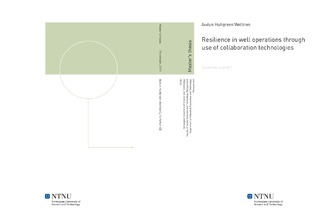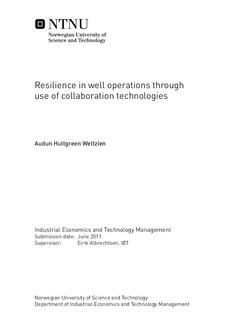| dc.contributor.advisor | Albrechtsen, Eirik | nb_NO |
| dc.contributor.author | Weltzien, Audun Hultgreen | nb_NO |
| dc.date.accessioned | 2014-12-19T14:27:39Z | |
| dc.date.available | 2014-12-19T14:27:39Z | |
| dc.date.created | 2012-01-06 | nb_NO |
| dc.date.issued | 2011 | nb_NO |
| dc.identifier | 473571 | nb_NO |
| dc.identifier | ntnudaim:5987 | nb_NO |
| dc.identifier.uri | http://hdl.handle.net/11250/265909 | |
| dc.description.abstract | The thesis studied resilience in drilling and well operations at an oil company operating on the Norwegian continental shelf, with a major focus on the onshore drilling support function in the case company. Drilling for oil and gas involves significant risks, according to scientists, authorities and the industry itself. The risks of offshore oil extraction have also been manifested through major accidents like the Deepwater Horizon. At the same time, the industry faces challenges like less reservoirs and rising operating costs. The development of new technology for collecting and transmitting data and new ways of working emerged about a decade ago and is often referred to as Integrated Operations or simply IO. The changes made new ways of working over distance possible, which were said to have produced numerous advantages that would lead to improved productivity and profitability as well as HSE. Some scientists however have warned against possible negative risks associated to Integrated Operations that should be accounted for. At the same time, within the safety management science Resilience Engineering has evolved as a well acknowledged theory for building resilient organizations. However, the literature on Resilience Engineering is rather new, and some authors have called for more empirical studies of resilience in practice. To perform a study on resilience in practice in an IO environment, the following research questions were formulated: How does collaboration technology and integrating of operations influence resilience? How can resilience be engineered in an IO environment?A case study design was chosen, and the case was delimited to compass the selected case company's drilling and well operations units with the organization's onshore drilling support center as the core object of study. The qualitative research methods semi structured interviews of key personnel at the case company and observation of work practice were used for data collection. In addition some documents were used.The study started off by investigating how the case operates, and in particular how they utilize collaboration technology and work over geographical and organizational borders. Specifically, the focus of attention was to identify the risks and challenges in drilling and well operations and how the organization operates in such an environment. The data collection then focused on how the organization manages risks and what factors contribute to resilience. Relevant literature was reviewed in order to identify characteristics resilient organizations. The data collected at the case company were then compared with the literature study and the organization's resilience was then sought to explain.The analysis resulted in a set of recommendations that was seen as key contributors to resilience for the case, and may be useful recommendations for organizations in other relevant contexts. The suggested steps towards a resilient organization are: Organize the workers into teams of experts in collaborative open space offices Make sure employees have experience from relevant work practice Have organizational processes that facilitate collaboration in place Use analytics on historical and realtime data extensively Have knowledge databases with lessons learned and best practices Invest in new technology and workplace facilities Create positive attitudes towards change Encourage curiosity and employees' interest in their field of expertise | nb_NO |
| dc.language | eng | nb_NO |
| dc.publisher | Institutt for industriell økonomi og teknologiledelse | nb_NO |
| dc.subject | ntnudaim:5987 | no_NO |
| dc.subject | MTIØT Industriell økonomi og teknologiledelse | no_NO |
| dc.subject | Helse, miljø og sikkerhet | no_NO |
| dc.title | Resilience in well operations through use of collaboration technologies | nb_NO |
| dc.type | Master thesis | nb_NO |
| dc.source.pagenumber | 74 | nb_NO |
| dc.contributor.department | Norges teknisk-naturvitenskapelige universitet, Fakultet for samfunnsvitenskap og teknologiledelse, Institutt for industriell økonomi og teknologiledelse | nb_NO |

